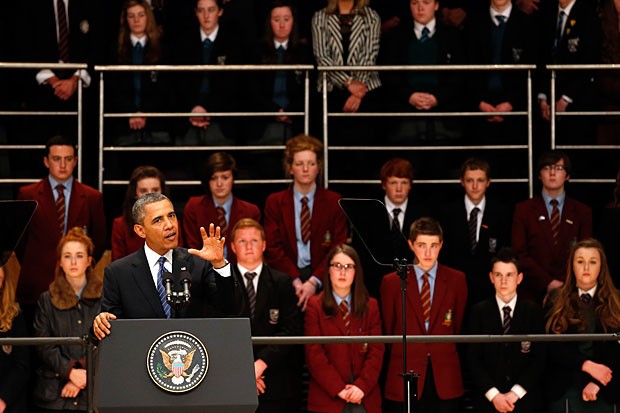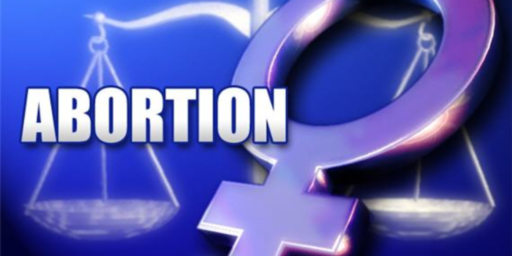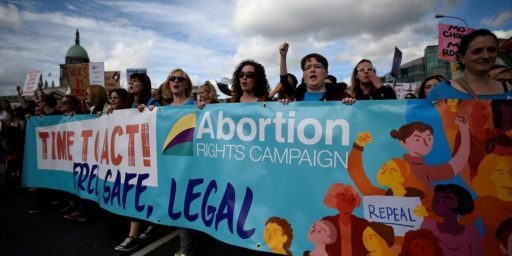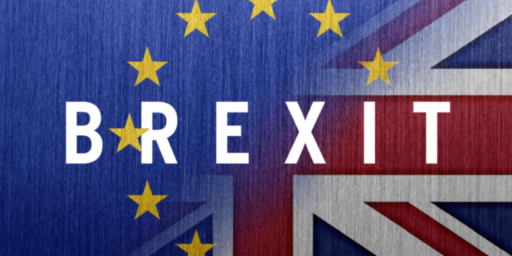Obama’s Comments On Education In Northern Ireland Create Outrage On The Right
Your latest Outrage Of The Day.
Some comments that President made during a speech while he was in Northern Ireland earlier this week for the G-8 Summit are causing many on the right to accuse him of making anti-Catholic, or at least anti-school choice statements and, of course, the usual outrage machine has been out in full force. Before we get too far into the weeds on this one, though, let’s take a look at what the President actually said as set forth in the prepared remarks for his speech on the White House website:
Your generation, a young generation, has come of age in a world with fewer walls. You’ve been educated in an era of instant information. You’ve been tempered by some very difficult times around the globe. And as I travel, what I’ve seen of young people like you — around the world, they show me these currents have conspired to make you a generation possessed by both a clear-eyed realism, but also an optimistic idealism; a generation keenly aware of the world as it is, but eager to forge the world as it should be. And when it comes to the future we share, that fills me with hope. Young people fill me with hope.
Here, in Northern Ireland, this generation has known even more rapid change than many young people have seen around the world. And while you have unique challenges of your own, you also have unique reasons to be hopeful. For you are the first generation in this land to inherit more than just the hardened attitudes and the bitter prejudices of the past. You’re an inheritor of a just and hard-earned peace. You now live in a thoroughly modern Northern Ireland.
(…)
From the start, no one was naïve enough to believe that peace would be anything but a long journey. Yeats once wrote “Peace comes dropping slow.” But that doesn’t mean our efforts to forge a real and lasting peace should come dropping slow. This work is as urgent now as it has ever been, because there’s more to lose now than there has ever been.
In today’s hyper-connected world, what happens here has an impact on lives far from these green shores. If you continue your courageous path toward a permanent peace, and all the social and economic benefits that have come with it, that won’t just be good for you, it will be good for this entire island. It will be good for the United Kingdom. It will be good for Europe. It will be good for the world.
We need you to get this right. And what’s more, you set an example for those who seek a peace of their own. Because beyond these shores, right now, in scattered corners of the world, there are people living in the grip of conflict — ethnic conflict, religious conflict, tribal conflicts — and they know something better is out there. And they’re groping to find a way to discover how to move beyond the heavy hand of history, to put aside the violence. They’re studying what you’re doing. And they’re wondering, perhaps if Northern Ireland can achieve peace, we can, too. You’re their blueprint to follow. You’re their proof of what is possible — because hope is contagious. They’re watching to see what you do next.
Now, some of that is up to your leaders. As someone who knows firsthand how politics can encourage division and discourage cooperation, I admire the Northern Ireland Executive and the Northern Ireland Assembly all the more for making power-sharing work. That’s not easy to do. It requires compromise, and it requires absorbing some pain from your own side. I applaud them for taking responsibility for law enforcement and for justice, and I commend their effort to “Building a United Community” — important next steps along your transformational journey.
Because issues like segregated schools and housing, lack of jobs and opportunity — symbols of history that are a source of pride for some and pain for others — these are not tangential to peace; they’re essential to it. If towns remain divided — if Catholics have their schools and buildings, and Protestants have theirs — if we can’t see ourselves in one another, if fear or resentment are allowed to harden, that encourages division. It discourages cooperation.
Ultimately, peace is just not about politics. It’s about attitudes; about a sense of empathy; about breaking down the divisions that we create for ourselves in our own minds and our own hearts that don’t exist in any objective reality, but that we carry with us generation after generation.
And I know, because America, we, too, have had to work hard over the decades, slowly, gradually, sometimes painfully, in fits and starts, to keep perfecting our union. A hundred and fifty years ago, we were torn open by a terrible conflict. Our Civil War was far shorter than The Troubles, but it killed hundreds of thousands of our people. And, of course, the legacy of slavery endured for generations.
Even a century after we achieved our own peace, we were not fully united. When I was a boy, many cities still had separate drinking fountains and lunch counters and washrooms for blacks and whites. My own parents’ marriage would have been illegal in certain states. And someone who looked like me often had a hard time casting a ballot, much less being on a ballot.
But over time, laws changed, and hearts and minds changed, sometimes driven by courageous lawmakers, but more often driven by committed citizens. Politicians oftentimes follow rather than lead. And so, especially young people helped to push and to prod and to protest, and to make common cause with those who did not look like them. And that transformed America — so that Malia and Sasha’s generation, they have different attitudes about differences and race than mine and certainly different from the generation before that. And each successive generation creates a new space for peace and tolerance and justice and fairness.
The portion of Obama’s comments that are causing ire here in the U.S. are highlighted but I felt it necessary to provide some context for those remarks. Clearly, the President is addressing issues of social division in Northern Ireland and the need to address those divisions so they don’t fester into the seeds of renewed conflict. That’s now how conservatives here in the U.S. appear to be taking them, thoug. Their reaction is roughly equivalent to these comments from a publication called the Scottish Catholic Observer:
The US President has made an alarming call for an end to Catholic education in Northern Ireland in spite of the fact that Archbishop Gerhard Müller told Scots that Catholic education was ‘a critical component of the Church.’
President Barack Obama (above), repeated the oft disproved claim that Catholic education increases division in front of an audience of 2000 young people, including many Catholics, at Belfast’s Waterfront hall when he arrived in the country this morning.
“If towns remain divided—if Catholics have their schools and buildings and Protestants have theirs, if we can’t see ourselves in one another and fear or resentment are allowed to harden—that too encourages division and discourages cooperation,” the US president said.
The US politician made the unfounded claim despite a top Vatican official spelling out the undeniable good done by Catholic education in a speech in Glasgow on Saturday and in his homily at Mass on Friday.
Archbishop Gerhard Müller (below), prefect of the Congregation of the Doctrine of the Faith, told an audience in Scotland that Catholic education provided a rare place where ‘intellectual training, moral discipline and religious commitment would come together’ while giving the presitigous Cardinal Winning Lecture on Saturday to officially launch the St Andrews Foundation for Catholic teacher education at Glasgow University.
This assessment of Obama’s remarked has largely been picked up uncritically by conservatives here in the United States, many of whom jumped on it to stoke quite obviously phony concerns that the President would now try to lead some kind of crusade against Catholic education here despite the fact that there’s absolutely no evidence to support that claim. What’s interesting, though, is to take a look at how the President’s remarks were received in Ireland, in both the Republic of Ireland itself and in Northern Ireland. What one finds is that there isn’t nearly the same kind of outrage that this obviously biased account from a Church newspaper in Scotland among the people to whom the President’s remarks were addressed.
For example, here’s how the Irish Times, a Dublin paper, reported the story:
When congratulatory words and diplomatic language are stripped away, the message President Barack Obama delivered to the young people of Northern Ireland is that they and their leaders should be more ambitious in working towards a shared future. Invoking personal experience of racism and exclusion in the US, Mr Obama identified segregated education and housing as key determinants of mistrust and social tensions and advised that while change came through courageous lawmakers, it was most often driven by committed citizens. Young people, he said, should push their politicians.
Mr Obama’s comments reflect a sense of urgency that the potential of the peace process needs to be developed and promoted. The North could offer warring factions elsewhere a blueprint, he said, and people were watching. And although commending the Northern Executive and Assembly for their commitment to a document “Building a United Community” – circulated last month by First Minister Peter Robinson and Deputy First Minister Martin McGuinness – it was faint praise.
Top of their “to-do” list was an all-party approach to parades, protests and flags, followed by a jobs programme for young people and the establishment of shared summer schools. A handful of shared education campuses would follow, along with shared neighbourhood developments. Interface barriers would be reduced, or removed, within 10 years.
The incremental nature of the programme, which has since been offered special funding by the British government, clearly reflects the tensions and mistrust that persist within both communities. But, as Mr Obama said, peace isn’t about politics, but personal attitudes; about individuals’ willingness to reach across divides; about allowing kids to play with kids who attend a different church; about making choices, standing against violence and hatred.
And here’s how the Belfast Telegraph put it:
On a visit to Belfast ahead of attending the G8 summit in Co Fermanagh, Mr Obama hailed the achievements that had been made to end conflict but insisted much more work was left to do.
Addressing an audience of 2,000 invited guests at the city’s Waterfront Hall, the majority of whom were school children, the president said it was up to young people to challenge hardened attitudes and prejudices and push the current generation of political leaders to drive towards lasting reconciliation.
“As all of you know all too well, for all the strides you have made, there’s still much work to do,” he said.
“There are still people who have not reaped the rewards of peace, there are those who are not convinced that the effort is worth it.
“There are still wounds that have not been healed and communities where tension and mistrust hangs in the air. There are walls that still stand, there are still many miles to go.”
He added: “Peace is indeed harder than war. Its constant fragility is part of its beauty. A bullet need only happen once but for peace to work we need to be reminded of its existence again and again and again.
(…)
Noting the religious divisions that still exist in Northern Ireland society, Mr Obama suggested the time had come to address challenges such as separated schooling and housing.
“Issues like segregated schools and housing, lack of jobs and opportunity, symbols of history that are sources of pride for some and pain for others – these are not tangential to peace, they are essential to it,” he insisted.
“If towns remain divided, it Catholics have their schools and buildings and Protestants have theirs, if we can’t see ourselves in one another, if fear and resentment are allowed to hardened, that encourages division, it discourages co-operation.
“Ultimately, peace is not just about politics, it’s about attitudes, it’s about a sense of empathy, it’s about breaking down the divisions we create for ourselves in our own minds and our own hearts that don’t exist in any objective reality but we carry with us generation after generation.”
Neither news report, from two of the leading news sources in both the Catholic south and the Protestant North, expressed any negative reaction to the President’s remarks. Indeed, both reports seem to be generally positive in their reaction to what the President had to say here. Now, obviously, there may be some people in both regions that were upset by the President’s remarks, and I will admit to not having checked every news source in Ireland and Northern Ireland. However, it strikes me that what’s going on here is that American conservatives have jumped on the interpretation of the President’s remarks put forward by one side of the religious divide that is still a fact of life in Northern Ireland (albeit a source located in Scotland, not Northern Ireland) and jumped on it as yet another means to bash the President and accuse him of saying things that he didn’t actually say, while at the same point reading into what he said things he clearly didn’t say.
Reading through the President’s speech, or watching it as you can in the video embedded below, it’s fairly clear that the President was directing his comments to the youth of Northern Ireland and using the speech to call on them to take up the banner of the peace that has blessed their own violent homeland and take it forward into a new generation so that it becomes a permanent peace, not just a respite in a war that had been going on for decades and taken far too many innocent lives. Part of that call included the idea that the remaining social barriers between Catholics and Protestants, including the fact that parents still tend to send their children to separate schools based on religion. He went on to draw an analogy to America’s own past, the problems that racially segregated education created in healing our own wounds, and the progress that has been made in that area ever since we worked to send segregation in education and other areas.
Now, obviously, there are differences between what’s going on in Northern Ireland and the Jim Crow era in the United States. The most important one,of course, is the fact that the segregation that is going on in Northern Ireland is, by and large, the result of individual choice rather than government policy. However, I don’t see anything in the President’s speech where he was suggesting that the government should force parents to send their children to religiously integrated schools, or that Catholic education should be outlawed. Instead, that part of his speech clearly reads as an explicit appeal to individual choice and calls upon individuals to continue healing the divides that still exist in Northern Ireland, and indeed in Ireland itself in some cases. There’s also no reference in this speech to education in the United States, nor is there anything in the President’s record to indicate that he believes that private Catholic education in the United States should be outlawed. Indeed, such a move would be clearly unconstitutional, not to mention the fact that it would push in to public schools tens of thousand of children that they’d have to figure out how to accommodate.
Now, one can criticize the President for going into another country and offering them advice about a conflict that they’ve been living through for generations. Indeed, I’m typically uncomfortable when any President does that largely because I know how such rhetoric would feel if a foreign leader came to the United States and purported to do the same thing. At the same time, though, I can’t see what there is that could possibly be objectionable about what the President said to this group of students in Belfast. Not only were the remarks well received by the audience, they strike me as being entirely appropriate and nowhere near the “radicalism” that I’ve seen some conservatives describes them as. In the end, what the President was suggesting to these young people is that the work to break down the remaining issues that divide them in order to ensure that the peace that has been maintained since the Good Friday Agreement in 1998 continues far into the future. Part of that includes ending the separation between religions so that the people of Northern Ireland start to see each other as a united people rather than two sides in a battle that could someday erupt again, which would not be in anybody’s interest except those who live to perpetuate violence.
At their best, the President’s comments to this group of young people was meant to be inspirational, at worst they were just innocuous comments from an American politician that will be quickly forgotten. To find something dark and conspiratorial in them, though, you’ve got to be looking at the world through some pretty distorted partisan lenses.
But don’t take my word, watch the speech for yourself (includes an introduction from Mrs. Obama):







How dare the President condemn sectarianism that has resulted in thousands of deaths and injuries to tens of thousands more?
How is this different from any other given day since January 20th, 2009?
Obama’s comments on _______ in ________ create outrage on the right
In other news, Dog Bites Man, Water is Wet
Ken wins.
I spend a lot of time in conservative Catholic circles, and this is the first I’ve heard about it. I think you’re overestimating the outrage.
If Obama said “God is good,” conservatives would denounce him for appeasing Muslim terrorists.
The one comment I found about it on National Review Online:
“And while I don’t think President Obama intended to blame Catholic schools for Irish sectarianism, I think he offered some very stale, generic, we-all-must-come-together rhetoric that glosses over why Catholics and Protestants in Northern Ireland have such animosity: [quote followed]”
If it doesn’t show up on NRO, it’s not a story in conservative Catholic circles.
As a product of the Catholic
Systematic Physical and Sexual AbuseEducation System (K-6), every time I read those words it just sounds better and better….. Sigh. A fallen Catholic can dream, can’t he?PS: Sister Rose Anthony was a Saint, 2nd and 4th, Sister Kathleen, 5th & 6th, will burn in hell. Sister Hildegarde? Don’t tell me you didn’t know, Purgatory for all of eternity.
Breitbart is already running with it and it has shown up on my Facebook feed. I won’t even dignify it with a link.
On a slightly more serious note, listening to the arguments of Conservatives makes me think they preferred the old divided Germany.
Ugh. I made the mistake of looking at the Twitchy link. That is an entire microcosm of people who are The Problem rather than The Solution. The US, indeed, the entire human race, would be massively improved by taking every single person even tangentially connected to that article and shooting them into space.
Is anyone surprised at this? If the President said the sun was yellow the right would be outraged! They read things into every little word said by the President and it’s always detrimental! It’s got to the point where the right are outraged at their outrage and everything that goes wrong in their parallel universe is President Obama’s fault. For Gods sake stick a fork in the lot of them, they are done!!
Can we have a new tag – “Republicans are a bunch of whiny-ass titty babies”? It would be filled up pretty quickly.
Obama’s Comments On [absolutely anything] Create Outrage On The Right
FIFY
And, just an observation –
Protestant-Catholic wars raged from the 1600s on in Europe. To say that the divisions that separated Ireland were (or are) anything but religious in nature, or that they began in the 20th century (or even the 19th century) is misguided.
Since Catholic schools in Northern Ireland and the US are generally open to students of all faiths, and in many situations are the go to option for poor kids who don’t have other good educational options, I don’t consider Obama’s educational statement so much to be outrageous as it is stupid and ill-informed.
But this IS the modern Republican party. They are unable to create anything, or even to be FOR something. They can only sit on the end of the bar and rail endlessly about what idiots and traitors the rest of us are.
Is there any reason to listen to anything Republicans say anymore?
Can anyone name one positive thing Republicans have contributed to this nation in the last 10 years?
Seriously….anything???
@Sam Malone:
Here’s one positive thing Republicans have done. Had more voters vote for a Democrat! That’s it though.
@Sam Malone: Iraq? Oh wait a minute, you meant something good…… Boy, that’s a hard one.
@HarvardLaw92:
Again, I’ve got to call BS on the entire “it’s all religious in nature” explanation. Granted the Catholic/Protestant divide is critical, but one needs to remember that, going back to at least the Tudors, each of those sects were also bound to very specific centers of political and economic power.
And moving forward the fact, for example, that Protestant = British = Invader/Occupier = Economic/Political Power cannot be ignored. To simply focus on the “Protestant” part of that equation misses all of those other, critically important factors.
Yes. Religion becomes the easiest external marker. But that’s mistaking the map for the territory.
The protestant Irish were brought in as colonizers by English overlords, IIRC. Religious divisions made peace harder, no doubt. But the original conflict was about more.
Bah, MattB said it already. Well, I agree. So there!
I think those of you defending the president’s remarks are doing so too strenuously. Religious education is compulsory in all schools in the United Kingdom. The net effect of that requirement is that Catholics and Protestants have their own schools, both of which get some support from the government. Now, you may not like that arrangement but it’s the arrangement they have and critiquing it will at least be taken as “why can’t they be more like us?”
Our history and circumstances differ from theirs and, awful as the violence in Northern Ireland has been, criticism that is unaware of the history and circumstances, however well it’s intended, will inevitably be taken as yet another instance of American provincialism.
@Matt Bernius:
It’s only the “easiest external marker” when you’ve never seen Northern Irish Protestants and Northern Irish Catholics. The Northern Irish Protestants are rather obviously ethnic Scots.
Segregated schooling might be familiar but it’s a rotten base on which to build a pluralistic society. Particularly that society, given the events past. For all the piss and vinegar, it turns out the President is right on.